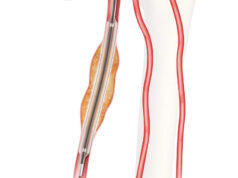I’ve described my nightmares before. But they are becoming more frequent. Night after night I would see myself in an operating room or Endo suite as a faceless wraith without a stable identity, morphing seamlessly from one specialty designation to another. Was I a vascular surgeon, a radiologist, a cardiologist, a vascular internist, a vascular specialist? This terrifying loss of awareness of my persona prompted me to make an appointment to see a psychiatrist.
As someone who has always felt comfortable with my own self-image, it was with a sense of reluctance that I confessed to this stranger that I was confused about my identity. However, once I lay down on his couch my inhibitions rapidly subsided. I blurted out, “Doctor, please help me. … I just don’t know what I am anymore. I seem to be losing my professional identity.”
He picked up my file and read it with a puzzled expression.
“Dr. Samson, I see you are a board-certified vascular surgeon. But you have intimated that you interpret your dreams as suggesting that you may not be one?”
I replied that it was only over the last few years that I had become unsure of my identity.
I told him that at times when I am introduced to someone at a cocktail party and they ask me what I do, I tell them I’m a vascular surgeon, yet they look puzzled. Then as if proud of their general knowledge they excitedly reply “Oh, I know, you treat varicose veins.”
Sighing, I would reply “Actually, you are correct but I also do things like preventing amputations and stroke, and I also manage abdominal aneurysms that if left untreated can cause sudden death.” Clearly I was trying to impress them that I don’t treat only a cosmetic nuisance but also life- and limb-threatening conditions. Nonetheless, their glazed, uncomprehending eyes remind me that most members of the lay public have no knowledge about these maladies nor that vascular surgeons are the doctors who treat them. To add insult to my already injured ego, their next comment is usually along the lines of “My cardiologist just did a full work-up and she told me that my carotid arteries and leg arteries have a cholesterol buildup and that if it gets any worse she may need to stent them. By the way what do you think of this ugly vein on my leg?”
Noticing that I had stopped talking the pyschiatrist asked “I can see that you are unhappy that patients may not know what you do, but why do you feel confused?”
“Well, a lot of what I now do doesn’t involve surgery. In fact most days I’m in an angiography suite doing stents and angioplasties or in my office prescribing medications.” He remained silent. I went on.
“I just don’t know who I am anymore. … I mean, am I a vascular surgeon or a vascular specialist? Maybe a vascular proceduralist? Or a vascular interventionalist?”
Like most of his profession, he didn’t give me an answer but rather proposed another question. “I see you are part of a private practice group, Sarasota Vascular Specialists. Doesn’t that define who you are?”
“Well,” I replied “Not really. You will notice that under that name we write ‘The Vein and Artery Experts’ because we know most people, even other physicians, may not know what that implies. Just the other day a referring doctor told me he had sent a patient with a DVT to the interventional radiologist for lytic therapy. He did not know I also provide that treatment or even that I can insert vena cava filters.”
As he had served as a high level officer in several psychiatry organizations and was academically inclined my therapist digressed and questioned me on the manner in which my specialty organization refers to itself.
“That’s the problem,” I quickly answered. “We have been all over the place. At one stage we were the International Society of Cardiovascular Surgery – then the American Association of Vascular Surgeons, and now the Society for Vascular Surgery. But some felt we should also lay claim to venous disease, and so we established the American Venous Forum.
“We even felt the need to come out with a new Journal for venous and lymphatic disease. Then some young vascular surgeons, concerned that the Peripheral Vascular Surgery Society did not convey all that we do, changed that name to the Vascular and Endovascular Surgery Society. And now I am aware that some of our leaders of the Society for Vascular Surgery are worried that the word ‘Surgery’ scares our patients and are suggesting a transition to the Society of Vascular Specialists.”
“Well then, why not just call yourself a vascular specialist?” Good point I thought as I lay there on his couch. But then it occurred to me that perhaps physicians who weren’t surgeons but who also dedicated themselves to vascular diseases could also refer to themselves as vascular specialists.
What would differentiate us? After all they can’t operate but I can. Wouldn’t this somewhat ambiguous word “specialist” further cause me an even greater identity crisis?
My brain started racing. Now I realized I was jealous of all those other specialists whose professional identity was defined by their specialty’s name. Everyone knows that a gynecologist treats only women, the orthopedist can mend broken or diseased bones, and the proctologist treats … well, you know what!
“Maybe I’m a vasculologist?” I suggested.
He remained silent. Time seemed to expand. But in that darkened room I began to understand that he could not provide me with the answer to my identity crisis. It was up to me, my colleagues, and my specialty organization to explain to the lay public and other doctors what makes us so special. That we are indeed surgeons but that unlike any other specialty we alone can provide all forms of therapy to patients with vascular disease.
I was proud of this epiphany, and I eagerly shared it with him. He nodded approvingly. “You have made good progress but time’s up.”
As I stood to leave I noticed that he was rolling up his pant leg and staring at a bulging varicosity. He mumbled, “Hmmm … I’d better show this to my cardiologist. It may be serious.”
Dr. Samson is a clinical professor of surgery (vascular) at Florida State University Medical School, is president, Mote Vascular Foundation, and is an attending vascular surgeon, Sarasota (Fla.) Vascular Specialists. Dr. Samson also considers himself a member of his proposed American College of Vascular Surgery.












